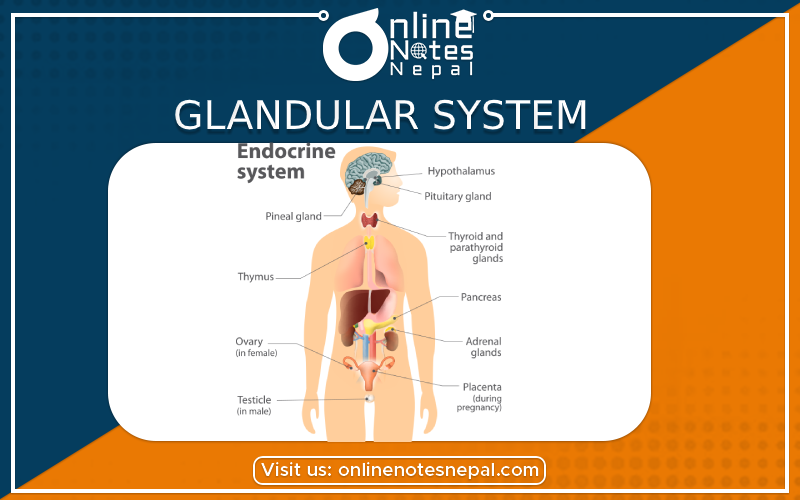Published by: Nuru
Published date: 06 Jul 2021

Our glandular system is the communication network that regulates our ambitions and emotions, promotes growth and sexual identity, helps to control body temperatures, assists in the repair of broken tissue, and helps our bodies to generate energy. Our glandular system communicates using chemical substances called hormones. It can stimulate reactions within the body that can last for a few hours days.
The group of the cell which produces a special type of hormone is called gland. There are two types of glands in our body, they are:
The gland with the duct in your body is called the exocrine gland. The exocrine gland produces mucus, sweat, saliva, and digestive juices.
Example: Salivary gland, tear gland, e.t.c.
The gland without duct in our body is called the endocrine gland. It produces a special type of liquid chemical substance known as a hormone.
Any disturbance in the functioning of these glands results in dwarfism, gigantism, obesity, sterility, mustache, and beard in women.
Example: Pituitary gland, adrenal gland, e.t.c.

Fig: Endocrine Glands in the human body[/caption]
Difference between Endocrine and Exocrine Gland
|
Exocrine Glands |
Endocrine Glands |
| 1. These glands have ducts. | 1. These glands don’t have ducts. |
| 2. They secrete enzymes. | 2. They secrete hormones. |
| 4. They discharge their secretions through the ducts. | 3. They discharge their secretions directly into the blood. |
| 5. These glands are present near the site of action. | 4. These glands may be present at a distance from the site of action. |
Hormones
The special type of liquid chemical substance released from the endocrine gland is called hormones.
The function of the hormone is to help in growth, development, maturation, reproduction, e.t.c.
The hormone is called a chemical messenger because it plays an important role to activate the body cells and the functions of our glands in the body.
Different types of endocrine glands are:
It is a small pea-sized structure located below in the cerebellum. It produces growth hormone which helps in physical and mental development and produces a catalytic hormone that controls the other gland.
Under (hypo) secretion of its hormones results in dwarfism, obesity, weak development of sex organs whereas over secretion results in excessive tallness in humans called gigantism.
The pituitary gland is called the master gland because the catalytic hormone produced by the pituitary gland controls the activities of other glands.
Two thyroids lie on either side of the trachea. They produce thyroxin a thyrotropin hormone that contains iodine, to produce thyroxin hormone iodine is necessary. It affects the functions of the body cells and physical growth.
Deficiency of thyroid hormones results in problems like puffiness and roughness of the skin, falling of hairs, the person looks mentally and physically weak, stammering, and a sign of obesity. Over secretion of these hormones also affects the nervous system, loss of weight, mental imbalance, bulging eyes, disorder in the digestive system, and excessive excitement.
There are four small epithelial tissues just behind the thyroid glands. These are called the parathyroid gland. they produce a parathyroid hormone that controls the exchange of calcium between blood and bones and increases calcium content in the blood.
Under secretion of this hormone results in wrinkles in the face and hand due to the lack of calcium in the bone as it causes weakness in the bone. if this hormone is over secreted parathyroid tumor and kidney stones may be developed.
The pancreas releases insulin which helps to control sugar levels in the blood. The function of insulin is to control the level of sugar in the blood.
If the insulin level is less, then it results in a high level of sugar content in the blood. A person feels more hungry and thirsty, the appearance of sugar in the urine, increased volume of urine, loss of weight, and delay in wound healing.
The pancreas is called a mixed gland because it works as both endocrine and exocrine glands. As an endocrine gland, it produces insulin hormone and as an exocrine gland, it produces pancreatic juice.
There are two adrenal glands above the kidneys. They produce adrenaline which keeps the body ready for various functions.
If the production of the adrenal is less it results in weakness, low blood pressure, less sugar content in the blood, nausea, unconsciousness, e.t.c.
The adrenal gland is called the emergency gland because it keeps the body ready for various functions and helps the body in an emergency like fear, anger, e.t.c.
The testis of males and ovaries of the female are called gonads. the release of the hormones by testis is testosterone and ovary is progesterone and estrogen. It helps with the development of male and female sex organs.